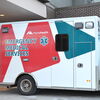
Processing Your Payment
Please do not leave this page until complete. This can take a few moments.
Snow Pond Learning & Innovation Center finishes with a flourish
 Photo / Maureen Milliken
The Snow Pond Learning & Innovation Center is the newest building on the campus in Sidney, and will be the center of its distance learning program. The building was officially dedicated Tuesday.
Photo / Maureen Milliken
The Snow Pond Learning & Innovation Center is the newest building on the campus in Sidney, and will be the center of its distance learning program. The building was officially dedicated Tuesday.
The original design for the Snow Pond Center for the Arts Learning & Innovation Center in Sidney didn’t include a clock tower, but that was before a $1.8 million USDA Community Facilities Loan in May.
The USDA money allowed the organization to add some square footage and an elevator to the 6,400-square-foot two-story building. And how better to top off an elevator shaft than with a clock tower?
“To look at it, you’d never know it was an elevator shaft,” John Wiggin, executive director of Snow Pond Center for the Arts, said on Tuesday, before the building’s ribbon-cutting and dedication.
The clock, which is due to arrive in a few weeks from Electric Time Co. Inc., of Medfield, Mass., is one of the last touches remaining for the center, which is used by Snow Pond Arts Academy during the day and in the afternoon by the center’s afterschool program for kindergarten through eighth-graders from around the region.
The building, which opened a year ago, not only has classrooms, but also music practice rooms, study areas and relaxation space. It was built by Snow Pond staff at a cost of about $1 million, and designed by Mike Richman, of Custom Concepts architects, of Scarborough.
The USDA loan, as well as a previous $130,000 grant from the USDA, will support the school’s distance learning program.
Christa Johnson, director of development for the arts center, said the technology has been added to three classrooms, and will eventually be added to all 12 classrooms.
The distance learning will allow the academy’s students to take advantage of instruction that wouldn’t otherwise be available in Maine, and is being done with support from the Manhattan School of Music, which has been involved with distance learning for 20 years, she said.
Latest piece in ambitious push

The learning center is one piece of an ambitious push for the 40-acre campus that began after Wiggin became executive director in 2010.
Wiggin’s grandfather, in 1937 started the New England Music Camp, which still operates at the site in the summer.
The nonprofit Snow Pond Center for the Arts in the past few years has added a music festival, a summer concert series, adult music camp, community music school, the after-school program and the arts academy, which opened as a charter high school two years ago.
Now the nonprofit organization is poised to become a community arts and gathering center that extends beyond Sidney, Wiggin and Johnson said Tuesday.
This year’s expanded summer concert series at the Bowl in the Pines amphitheater was the first foray into that expansion. Though upgrades to the Bowl area aren’t complete, some 1,700 people from across the country and Canada attended a September performance by Fab Four, a Beatles tribute band.
“It’s funny, the concerts are what everybody wants to talk about,” Wiggin said. “But we have a lot more going on.”
'A lot going on'

Wiggin said infrastructure renovations to make the campus usable year-round, including adding parking that will eventually accommodate nearly 1,000 cars, are big piece of the plan.
Another piece is adding two miles of four-season trails in the woods across Route 23. The organization has owned the 285 acres, but hasn’t done much with it.
The trails have been cut in the woods, and by next summer will be graded and made accessible for people with mobility issues. While they’ll initially be on 135 acres, bridges over marshland will be eventually added to add more miles to the trail systems.
Part of the marshy area is clear enough to be used for ice skating, and that’s in the plan, too, Wiggin said.
A parking lot on that side of the road will provide overflow parking for Bowl events, as well as for those using the trails.
The organization has been working with Sidney planning and recreation departments, and the trails will be for public use.
The next step is completing the upgrade to the 88-year-old Bowl in the Pines, a project designed by Carla Haskell of Design Group Collaborative, of Ellsworth.
Much of the work has been done, including expanding the stage and adding infrastructure for electricity and lights, including power poles a transformer that was installed Tuesday. Lights will have ambient lighting for nighttime concerts as well as spotlights for when the show is over.
The major electrical upgrade by Central Maine Power Co. will also include wiring the stage for audio-visual use.
The entrance to the bowl, on Route 23, has been widened to ease bottlenecks.
The $675,000 upgrade will also increase seating from 2,000 to 6,000, and the organization expects shows to eventually bring an estimated $300,000 per event in revenue to area businesses.
Johnson said it will be done in time for next summer’s concert series, which will include Who’s Bad, a Michael Jackson tribute.
Sidney in the middle
The center this year has hosted a number of Sidney community events, including a farm-to-table public supper and a meeting to find out what community need are.
The town, which is bordered by Messalonskee Lake to the west and the Kennebec River to the east, and stretches from Augusta to Waterville, doesn’t have a real center, but Johnson said the campus could become one.
In the works are a weekend restaurant at The Lodge, a campus building on the lake that includes an industrial kitchen, and a winter event lineup, some of which will be in Alumni Hall, which has an auditorium and was also recently upgraded.
Johnson said meals may be offered before the winter events as well.
This year’s lineup of events is modest — an Oct. 27 Red Cross blood drive for a community resident, the second annual Chili & Chowder Cook Off on Nov. 10, comedian Krazy Jake on Nov. 17; the Maine Pond Hockey Classic the weekend of February 8-10, Family Fun Day & Fishing Tournament winter carnival on Feb. 23, and the Elton John tribute band Yellow Brick Road on March 23.
Tuesday’s ribbon-cutting drew representatives from U.S. Sen. Susan Collins and Angus King’s offices, as well as from second-district U.S. Rep. Bruce Poliquin, whose Maine home is nearby in Oakland.
Also attending were Katie Doherty, CEO and president of the Kennebec Valley Chamber of Commerce, headquartered in Augusta, and Kim Lindlof, president and CEO of the Mid-Maine Chamber of Commerce in Waterville.
Wiggin and Johnson said that, while that day’s focus was on the school, it’s all part of the bigger picture.
“We’re in the middle (between Augusta and Waterville),” Johnson said. “We could be a real community center, not just for Sidney, but for the region.”









Comments